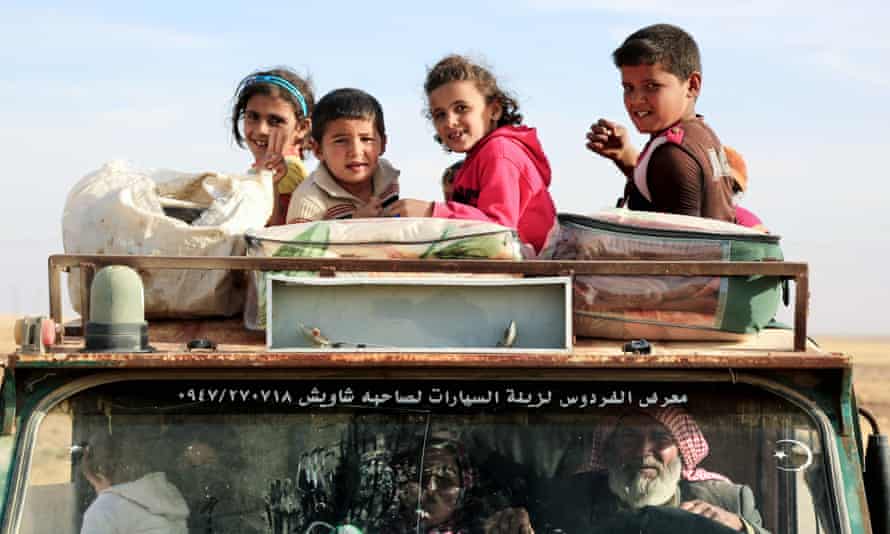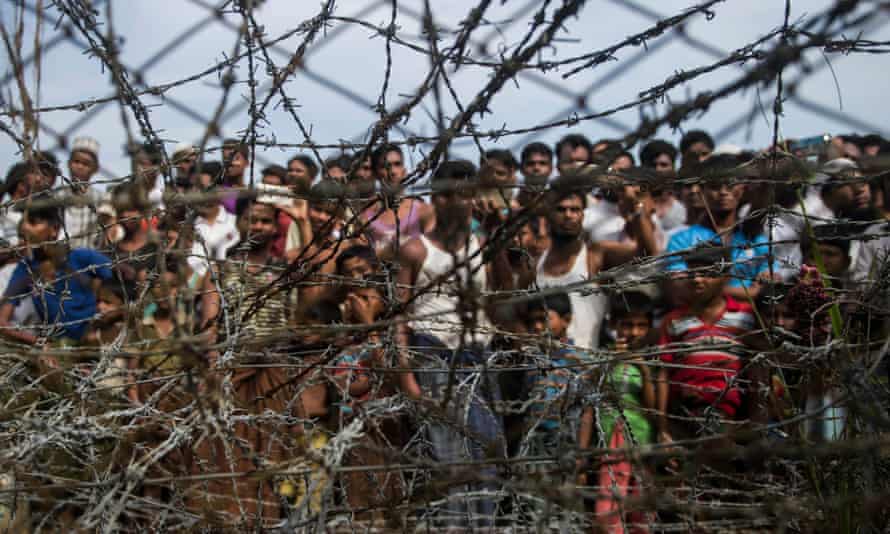BOOK OF THE DAY
The Displaced; Migrant Brothers; Lights in the Distance – reviews
Tim Adams
Sunday 6 May 2018
This September it will be three years since the body of Alan Kurdi, the three-year-old Syrian boy in red T-shirt and blue shorts, was washed ashore on a beach in Turkey. The picture that ran on the front pages of newspapers across Europe, and prompted calls for politicians to confront with all urgency what even the Sun called the “biggest crisis since the second world war”, was perhaps the only moment in recent memory in which popular empathy for refugees clearly outweighed disregard or antipathy.
 |
| Alan Kurdi |
For a month or more, maybe, after the picture ran, and Alan lay face down in all of our consciences, there was a feeling in European capitals that a different approach was desperately needed; several cities saw rallies in which crowds carried banners reading “Refugees Welcome Here”. In November, however, the Paris attacks happened, and the popular mood once again hardened against “migrants”. That new year the lurid reports of mass sexual assaults from crowds of young men of “north African appearance” in German cities were used to justify a far more alarmist rhetoric, which culminated in the calculated and algorithmed scaremongering leading up to the EU referendum. Weaponised borders became a critical and mythologised issue; deliberately “hostile environments” for “aliens” a matter of political pride. In the 24 months after Alan’s body was discovered on the sand, 8,500 people drowned or disappeared trying to cross the Mediterranean to a place of greater safety; had it not been for the volte face in humanity of the Italian coast guard, the number would have been far higher. Comparable numbers will have perished this year, but not one of their pictures has made lasting front-page news.
Those lost people on Europe’s seas are just the tiniest fraction of those now permanently adrift. When Nigel Farage gurned in front of his “Breaking Point” poster, the aim was to suggest a faceless and ceaseless army of otherness, and in terms of numbers at least, the portrait – if not its pitiless intent – was correct. By the time of Alan’s death, there were more displaced people in the world than at the end of the second world war: 65 million, an uprooted nation almost exactly the size of Britain. These people raise many questions, but a central one remains this: how do you bring the story of their lives home? And how, without that connection, without a picture of Alan, can the relatively settled population of the world, living inside rather than beyond borders, be encouraged or inspired to find the collective will to offer these strangers some kind of life?
These three books, each one committed passionately to those questions, try to answer them in different ways. Viet Thanh Nguyen attempts it by way of recent historical example, to show how waves of migration and assimilation have been the natural order of things – not a historical anomaly – and to reveal how cultures, like individuals, depend for their life on novelty and openness. He argues that those who arrive last invariably work hardest, create most fervently, inject most imagination – because their lives depend on it.
Nguyen, like the other writers he has invited to tell their tales here, speaks from experience. He was a refugee himself before he became a writer. He arrived in America with his parents, aged four, after the fall of Saigon in 1975. By that age he had known what it was like – though he cannot remember – to walk 184km, to see paratroopers hanging dead in trees along the road, to see his mother and father fight their way on to a boat while others were being shot, to be labelled “other” in military camps in Guam and the Philippines and Pennsylvania, and to settle finally in San Jose, where his parents, who ran a grocery store, were threatened several times by men with guns, once shot, and eventually forced from the neighbourhood they had helped to revitalise by the construction of a brand-new city hall, paid for with taxes from Silicon Valley businesses almost exclusively begun by entrepreneurial migrants and their children.

Nguyen’s parents, along the way, saved enough to send him to college. Forty years on from his epic odyssey from Saigon he is now chair of the comparative literature department at the University of Southern California. His debut novel, The Sympathiser, won a Pulitzer prize. Last year he was awarded a MacArthur genius grant. His collection of life stories from other refugees who have gone on to become celebrated writers – Marina Lewycka, born in a displaced persons camp in Ukraine before settling in the UK, Aleksandar Hemon, a Chicagoan from Bosnia, Dina Nayeri born in Iran, raised in America, now living in Britain, and many others – tells us something that I imagine we all intuitively know: that those who have journeyed furthest have invariably gained the most perspective.
The stories are beautifully, and often angrily, told, and felt, and add up collectively to documentary proof of the possibilities – of empathy and humanity – that even the most brutal of welcomes can bring. Unlike nearly all of the 65 million refugee stories currently on offer, however, these are defiantly survivors’ stories – they come with happy endings of settling and prospering, even if delayed by a generation. Nguyen reminds us that the instinct to close borders is a choice, not a historical rule, and that there have been moments in all national psychologies when “we have achieved the best of ourselves in our ability to welcome the other, to clothe the stranger, to feed the hungry”. Mostly, those times have been when we have collectively remembered that justice is not the same as law.
Changing the cycle, dealing with the “refugee issue” in that sense, requires a lasting shift in philosophy more than a temporary tweak of policy. Patrick Chamoiseau was born in Martinique and lived in France before returning to the island. He writes in a Creolised French all his own. His short, lyrical book, Migrant Brothers, was prompted by his growing personal knowledge of “hundreds of people – who had overcome deserts, oceans, walls, lines of barbed wire, checkpoints, who had survived nightmarish camps – only to crash against police violence in the very heart of Paris”. Chamoiseau looks for a framework of thinking that might give our consciousness a jolt to upend that narrative, to offer a manifesto “for a global humanity”. He argues for the “relational ecosystem”, for a “sentimography of globality” for “the open soul of borders”. His abstract task is heartfelt and sometimes profound, but ultimately doomed, you feel, to end in sentences like these, lost somewhat in translation: “The relational imaginary makes globality the domain of conscience. The latter can then without a shield take up the adventure of living in the fire of life…”
While the hoped-for expansion of consciousness takes place, more and more lives are lived in detention and degradation. The journalist Daniel Trilling, long a key British writer on these issues, takes a more direct approach to making “globality a domain of conscience”; he goes out and reports on the people who are held in awful protracted limbo on Europe’s margins.

His brilliantly researched and written Lights in the Distance is, above all, a book of witness – to add to those by Patrick Kingsley (The New Odyssey) and Charlotte McDonald-Gibson (Cast Away). Trilling resists much editorialising, though he knows all the arguments inside out, in favour of bringing his reader as close as possible to the actual circumstances of those who have found their way to Calais, or to Catania in Sicily or to London or to Athens, only to find themselves condemned to occupy space, rather than live. He finds out among a hundred other details both how exactly you cling to the bottom of a lorry on a motorway at night, and how you develop the desperation to attempt it. How families survive and don’t survive when “quarantined” interminably, fighting for status as human beings, and unable to work. And how shreds of hope can survive almost any level of intractable despair.
Trilling grew up hearing stories from his own grandmother, Teresa, twice a refugee, first from Russia, then from Nazi Germany, who arrived in London in 1939 clutching her only book, Vasari’s The Lives of the Artists. She thrived and lived to be 94. Her sanctuary – her welcome – was made possible, he argues, not by governments but by pressure on governments. He makes the case not only to resist the militarisation of immigration policy but also the “hierarchy of suffering” that pervades the debate on human rights, or the rhetoric that sees only “economic units” rather than people with real experiences.
Like the others, Trilling’s is not at all a hopeful book; we are living in a moment in which walls are going up rather than coming down – in 1990, 15 countries had walls or fences at their borders, by 2016 that number had risen to 70. But it ends with a set of questions that we all would do well to ask: “Why should anyone have to put up with these conditions? What set of interests does it serve to regulate their movement? And how likely is it that states that treat migrants with such callousness will behave similarly toward their own citizens?”
The Displaced: Refugee Writers on Refugee Lives Edited by Viet Thanh Nguyen is published by Abrams (£18.99).







No comments:
Post a Comment